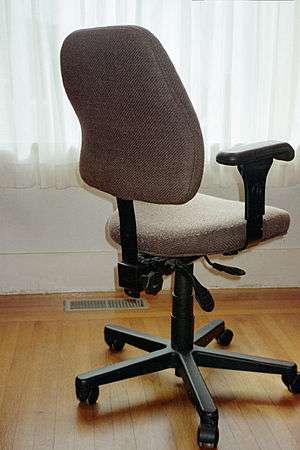Swivel chair
A swivel, spinny, or revolving chair is a chair with a single central leg that allows the seat to rotate 360 degrees to the left or right. The first swivel chair was invented by Thomas Jefferson, and is purported to be the chair on which he drafted the United States Declaration of Independence in 1776.[1]

Types and examples
Swivel chairs may have wheels on the base allowing the user to move the chair around their work area without getting up. This type is common in modern offices and are often also referred to as office chairs. Office swivel chairs, like computer chairs, usually incorporate a gas lift to adjust the height of the seat, but not usually large (e.g. recliner) swiveling armchairs.
A draughtsman's chair is a swivel chair without wheels that is usually taller than an 'office chair' for use in front of a drawing board. They also have a foot-ring to support the legs when it is not possible to reach the ground.
Swivel seat
When the swivel chair is installed in an aircraft, an automobile or on a stair lift and can not move independently because it is on a fixed base, it is rather called a swivel seat.[2] Some swivel seats are also bucket seats.[3]
Origin
.jpg)
Using an English-style Windsor chair, possibly made by and purchased from Francis Trumble or Philadelphia cabinet-maker Benjamin Randolph, Thomas Jefferson invented the first swivel chair.[1][4][5][6] Jefferson heavily modified the Windsor chair and incorporated top and bottom parts connected by a central iron spindle, enabling the top half known as the seat, to swivel on casters of the type used in rope-hung windows. It had no wheels. When the Second Continental Congress met in Philadelphia, Jefferson's swivel chair is purported to be the chair he sat upon when he drafted the United States Declaration of Independence in 1776. Jefferson later had the swivel chair sent to his Virginia plantation, Monticello, where he later built a "writing paddle" onto its side in August 1791.
Since 1836, the chair has been in the possession of the American Philosophical Society located in Philadelphia.[7][8][9]
See also
- Bárány chair
- Barber chair, another type of rotating chair
- Orbiter, a swiveling camera seat
References
| Wikimedia Commons has media related to Swivel chairs. |
- Thomas Jefferson- Scientist. Popular Science Magazine. Bonnier Corporation. February 1927. p. 19. ISSN 0161-7370.
- Moria, belle (16 December 2011). "Office Chair Replacement Parts". Cosy Offices. Retrieved 25 February 2017.
- American Philosophical Society Museum Web Site photo
- Homer, Trevor (2009). Born in the USA: The Book of American Origins. Sky Horse Publishing Inc. ISBN 1626369763.
- Thomas Jefferson. Heinemann-Raintree Classroom. August 2002. p. 12. ISBN 9781403404169.
- Materials Chemistry. Springer. 18 March 2011. ISBN 9789400706934.
- "Writing Chairs" (PDF). Gregory Le Fever.
- American Philosophical Society Museum Web Site Photo of Jefferson's original swivel chair.
- "F24 - Chair". amphilsoc.pastperfectonline.com. American Philosophical Society.
Revolving Windsor Chair with Writing Arm